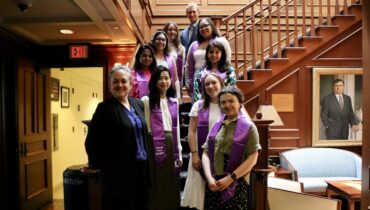Georgetown University offers a broad variety of graduate courses that teach students to critically engage with the most pressing issues of our time using a gender lens. In Spring 2025, many of such classes will be offered across the university—including several new classes.
Spring 2025 Graduate Courses
These graduate classes count towards the Georgetown Institute for Women, Peace and Security (GIWPS) Graduate Certificate in Gender, Peace and Security.
Gender, International Security and Development (MSFS 5600 / GOVT 5669; CRN: 38311)
Professor: S. Ayse Kadayifci-Orellana
Time: Monday, 2:00 p.m. – 4:30 p.m.
This class contextualizes gender issues and asks the question: how would we think about international peace, security, development approaches, and design intervention strategies if gender was treated as a central consideration in international affairs and peacebuilding programming? To answer this question, the class will explore both conceptual considerations related to gender and its practical application. This is a required course for the Gender, Peace and Security certificate.
Gender and Security Toolkit (SEST-6699; CRN: 46208)
Professor: Aapta Garg
Time: Tuesday, 5:00 p.m. – 7:30 p.m.
This advanced seminar will teach you concrete skills for ensuring gender is considered in peacebuilding, security, and development fields. The course will explore critical skills—from gender mainstreaming and gender analysis to gender-sensitive budgeting, research, monitoring & evaluation, and advocacy. The course will enable students to capably serve as gender focal points and learn how practitioners have successfully advanced gender in their diplomacy, development, and defense work. This is a required course for the certificate.
Women in the Global South
Professor: S. Ayse Kadayifci-Orellana
Time: Wednesday 5:00 p.m. – 7:30 p.m.
Women face challenges globally, experiencing discrimination that hinders their social, economic, and political progress across all regions. Advancing women’s empowerment is crucial for effective foreign policy, as research demonstrates that countries are more peaceful and stable when women are empowered. Over the past 20 years, international organizations like the UN and World Bank have mainstreamed gender perspectives into policy and programming, with women’s empowerment becoming central to the Women, Peace, and Security Agenda. This course will focus on the religious, cultural, economic, and political contexts of the Global South, where these challenges often intersect in complex ways. Through country-specific and region-specific case studies, students will examine how these factors either constrain or support women’s empowerment. The course will also highlight successful initiatives that have advanced women’s status, equipping students with a critical understanding of these dynamics and practical tools to promote empowerment in diverse global settings.
Conflict-Related Sexual Violence (SEST 6697; CRN: 44327)
Professor: Robert U. Nagel
Time: Monday, 5:00 p.m. – 7:30 p.m.
This course examines the causes and consequences of conflict-related sexual violence as well as the legal frameworks and policies governments and international organizations pursue to prevent, mitigate, and respond to conflict-related sexual violence. Throughout the course, we will engage with gender, race, and class as fundamental organizing principles that shape the creation of legal and normative human rights frameworks as well as their practical application.
Time: Monday, 5:30 p.m. – 7:00 p.m.
Digital transformation is having a wide range of broader societal impacts. The rise of AI, social media, and big data introduce new risks and complexities, including digital discrimination, online harassment, and the manipulation of vulnerable communities. These all pose significant threats to peace, democracy, and security, particularly for marginalized groups based on gender, race, and identity. This course examines technology’s intersection with societal frameworks, norms, and power structures. This course empowers students with a critical and inclusive lens for examining the implications of technology for societies. Students will explore how technological solutions interact with and reshape the societal challenges of our time, ranging from algorithmic biases to the global digital divide. By understanding the multifaceted ways technology intersects with societal norms, students will learn to craft gender and identity-sensitive, technology-based strategies for promoting equity, democracy, human rights, and ecological responsibility. Through theoretical instruction, real-life case studies, hands-on experiences, and in-depth discussions, students will investigate how data analysis, AI, and social media can be leveraged for greater security and equity. The goal is to develop innovative and inclusive strategies that resonate with principles of justice, human dignity, and ecological prudence.
Women & Gender in the Arab World (ARST-6532; CRN: 45458)
Professor: Fida Adely
Time: Tuesday, 3:30 p.m. – 6:00 p.m.
No issue related to the Arab world has garnered more attention than the status of women. This course will situate current preoccupations with women in the Arab world in historical and comparative perspectives, and within broader theoretical debates about gender and sexuality. Drawing on a variety of disciplines, we will consider the ways in which class, ethnicity, geography, religion, and culture shape the status, experiences, and desires of women in the region. Moving beyond a focus on women, we will also consider how conceptions of femininity and masculinity are constructed over time, and how in turn these concepts shape ideas about love, family, politics, and appropriate gender relations. Finally, the course will also situate the fields of women and gender studies in the Arab world in the larger debates and shifts within feminist theory, examining the ways in which scholarship in and about the region has emerged in conversation with broader feminist theories and projects.
This course is a graduate level seminar. Advanced level undergraduates will be considered for enrollment in the course.
Diversity & Inclusion in CR/Dev (MSFS 7620 / GOVT 8404; CRN: 46063)
Professor: Carla Koppell
Time: Thursday, 5:00 p.m. – 7:30 p.m.
Untapped power: Leveraging diversity and inclusion in conflict resolution and development. A substantial body of research underlines the need to attend to diversity and inclusion in diplomacy, development and conflict resolution. Numerous international resolutions, national laws and plans, and declarations of commitment are in place calling for attention to and equal treatment of ethnic and religious minorities, women, youth, members of the LGBT community, people with disabilities, as well as socio-economically marginalized groups. Yet, realization of the commitments sorely lags behind the rhetoric. This seminar will review how diversity and inclusion are important to peace and prosperity, and discuss progress advancing the agenda and barriers to advancement. The class will also provide analytical and practical tools for advancing diversity and inclusion in the practice of diplomacy, conflict resolution and international development.
Gender, Climate and Security (PPOL-6406 1; CRN: 46429)
Professor: Marisa O. Ensor
Time: Wednesday, 3:30 p.m. – 6:00 p.m.
Gender dynamics, climate change, and security considerations are interconnected in complex and impactful ways. The real-world implications of the so-called “gender-climate-security nexus” for the promotion of gender equity, the mitigation of climate change, and the advancement of peace and security are increasingly being recognized. This seminar examines the key concepts, theories, and approaches underpinning the field of Gender, Climate and Security from scholarship, policy, and practice perspectives. The course will cover issues such as intersectionality, gendered climate security in the Global South, masculinities, ecofeminism and environmental justice, the securitization of the environment, climate (in)security and environmental disasters, migration as a climate change adaptation strategy, and environmental peacebuilding. Discussions and materials will also cover the emergence of legal and normative frameworks adopted by the UN system to address these issues. Case studies will illustrate how the connections between intersectional gender, climate and security are being experienced in specific locations across the globe.
Queering International Development (GHDP-6648; CRN: 44258)
Professors: Fabrice Houdart & Caroline Vagneron
Time: Tuesday 05:00 PM – 07:30 PM
This course is only 1.5 credits.
How do we address social and economic exclusion and leave no one behind? This module will discuss the well-being of LGBTQ+ people around the world and strategies and approaches for promoting their inclusion. Despite some legal and social advances in the past two decades for segments of the broader lesbian, gay, bisexual, transgender, and queer (LGBTQ+) community, many LGBTQ+ people continue to face widespread poverty, discrimination and violence in many countries around the world. Tackling these issues is challenging but the Sustainable Development Goals’s principle of ‘leaving no one behind’ and WBG Twin Goals of promoting shared prosperity and ending extreme poverty offer a path for action.
Undergraduate DEI Courses
In addition to graduate courses, the University also offers a large variety of undergraduate classes engaging with gender and other Diversity, Equity, & Inclusion (DEI) topics. For undergraduate students who are interested in learning about how gender, race, class, religion, and other identities intersect with the world around them, we recommend these classes as a starting point, though Georgetown offers many wonderful options.
- Race, Racism, & Digital Tech, Professor Brienne Adams (CRN: 45533)
- Race, Gen, Col in LatAm & Carib, Professor Melanie White (CRN: 45537)
- Race & Color in Latin America, Professor Andrea Huezo (CRN: 45870)
- Economics of Diversity, Professor Lidia Ceriani (CRN: 43023)
- Women and Politics, Professor Michele Swers (CRN: 45945)
- Race, Gender, and American Pol, Professor Nadia Brown (CRN: 42885)
- Gender & Education in ME, Professor Nadya Sbaiti (CRN: 46694)
- Diverse Voices in Frgn Affairs, Professor Carla Koppell (CRN: 38650)
- Gender, Race, & Taste in Media, Professor Kelly Coyne (CRN: 45653)
- Language, Gender, & Sexuality, Professor Nadja Tadic (CRN: 46552)
- Performing Jewishness: Global Perspectives, Professor Jessica Roda (CRN: 47644)
- Jews and Muslims: Rethinking Narratives, Professor Jessica Roda (CRN: 48650)
- Gender, Env & Sustainability, Professor Patricia Biermayr-Jenzano (CRN: 46168)
- Labor/Sexuality/Globalization, Professor You-me Park (CRN: 38833)
- Gender & Sexuality in the MidEast, Professor Safoura Nourbakhsh (CRN: 45571)
- Black Women & Politics of Care, Professor Melanie White (CRN: 45904)
- Women, Poverty & Reproduction, Professor Tricia Hoefling (CRN: 45573)
- Gender and Political Campaigns, Professor Donna Brazile (CRN: 45574)
- Gender and Sustainability, Professor Patricia Biermayr-Jenzano (CRN: 40901)
- Intro to Disability Studies, Professor Lydia Brown (CRN: 45465)
- Crip/Mad/Queer Narratives, Professor Lydia Brown (CRN: 45414)
- Intro to Black Digital Studies, Professor Brienne Adams (CRN: 45530)
- Race & Radical Feminisms, Professor Rosemary Ndubuizu (CRN: 42232)
- Race in Internat’l Relations, Professor Desh Girod (CRN: 45941)
- Race, Religion, and Terrorism, Professor Edmund Husain (CRN: 44189)
- IR and Race, Professor Eboni Haynes (CRN: 46258)


